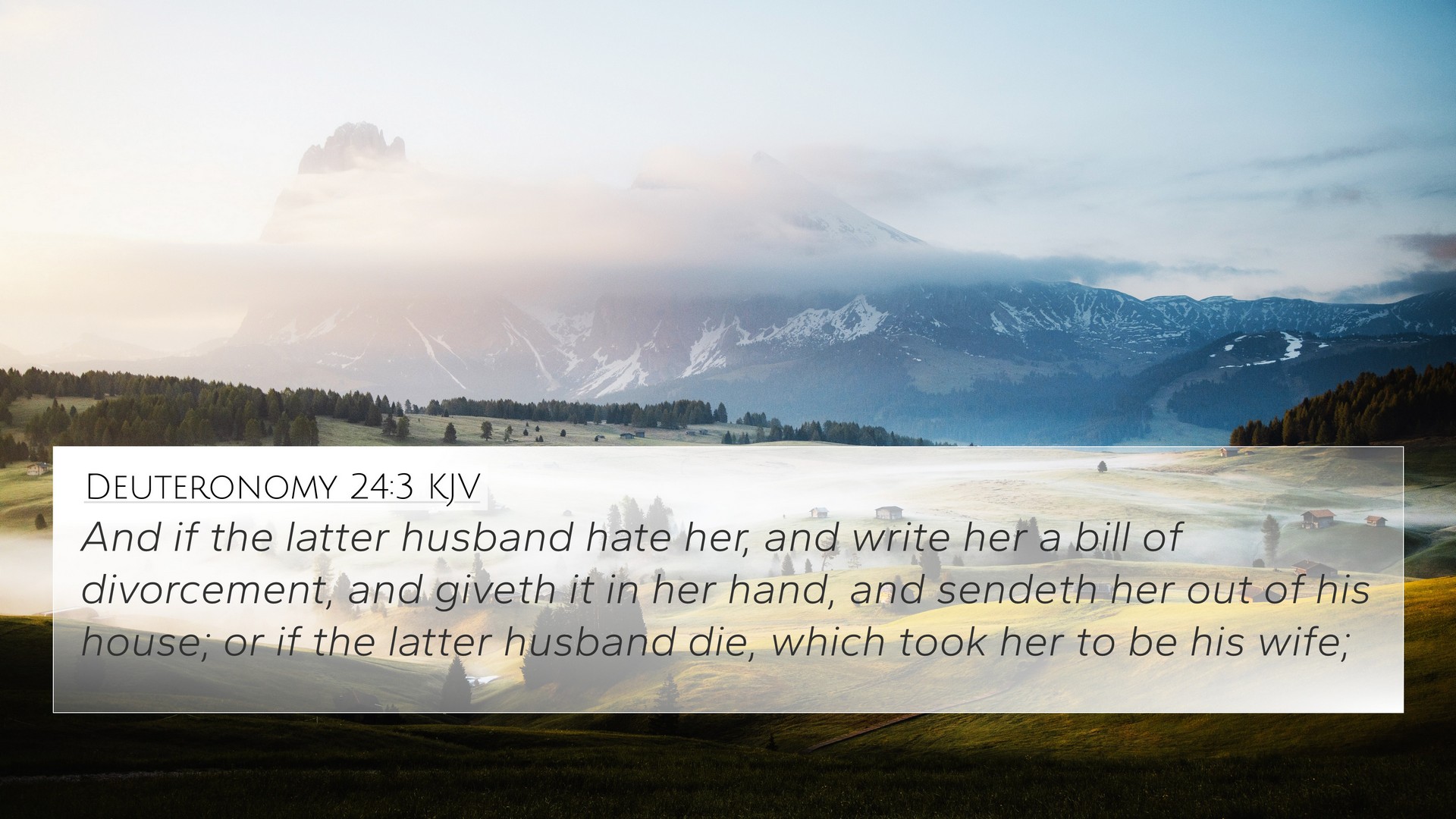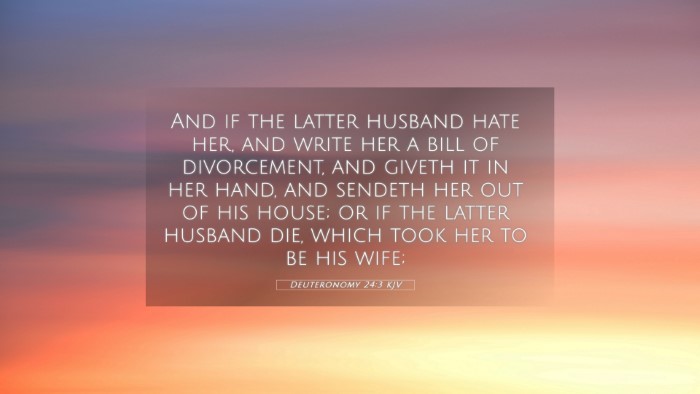Understanding Deuteronomy 24:3
Bible Verse: Deuteronomy 24:3
In this verse, the teachings surrounding divorce are articulated. It states, "And if the latter husband hate her, and write her a bill of divorcement, and give it in her hand, and send her out of his house; or if the latter husband die, which took her to be his wife."
Commentaries on Deuteronomy 24:3
Matthew Henry's Commentary
Matthew Henry emphasizes the compassion and the intention behind the law on divorce. He notes that the bill of divorcement was to protect the wife from becoming an object of shame and to allow her to remarry legally. Henry elaborates on the context of the society at that time, where women were often treated unfairly. The allowance for divorce highlighted the need for a lawful and dignified process even in cases of marital breakdown.
Albert Barnes' Notes
Albert Barnes stresses the significance of the documentation provided in such cases. The "bill of divorcement" served as a formal declaration, ensuring that the procedures adhered to God's commandments for the well-being of all parties involved. Barnes underscores that divorce was not a command but permissible under certain circumstances, reflecting the hardness of human hearts and the imperfections of relationships.
Adam Clarke's Commentary
Adam Clarke provides additional insights into the cultural practices surrounding divorce during biblical times. He suggests that the provisions made in Deuteronomy were progressive for that era, providing women with some legal standing. Clarke also discusses the moral implications of divorce and the importance of the commitment within marriage, guiding readers to consider the underlying theme of fidelity and divine expectations in relationships.
Thematic Connections
This verse is instrumental in understanding the broader Biblical teachings on marriage and divorce. Here are several cross-references that echo similar themes:
- Matthew 19:9: Jesus elaborates on the grounds for divorce and emphasizes the sanctity of marriage.
- Malachi 2:16: God expresses His disdain for divorce, underlining His desire for marital faithfulness.
- 1 Corinthians 7:10-11: Paul gives instructions regarding marriage and divorce, affirming the sanctity of vows.
- Luke 16:18: Jesus teaches about the seriousness of divorce and remarriage.
- Genesis 2:24: The fundamental principle of marriage as a lifelong union, establishing the foundation before any laws regarding divorce were given.
- Ephesians 5:31: Affirms the union of husband and wife, reiterating Genesis's teaching on the sacredness of marriage.
- Deuteronomy 22:19: Discusses the consequences of false accusations related to a wife’s fidelity, further emphasizing marital integrity.
- Romans 7:2-3: Explains how a woman is bound to her husband as long as he lives, and emphasizes the permanency of marriage vows in God’s eyes.
Practical Implications
The significance of Deuteronomy 24:3 extends beyond its historical context. It offers a profound insight into:
- Understanding God's Will: Helps believers navigate the complexities of human relationships, aiming for restoration and faithfulness.
- Justice and Compassion: This verse teaches the importance of justice in marital relationships, ensuring protection for those involved.
- Guidance for Cross-Referencing: This verse serves as an essential tool for linking biblical texts that address marriage, divorce, and their implications throughout both the Old and New Testaments.
Cross-Referencing Methodologies
For readers wanting to delve deeper into cross-referencing practices, here are some useful tools and methodologies:
- Bible Concordance: Utilize concordances to find verses related to specific terms like “divorce” or “marriage.”
- Bible Cross-Reference Guide: Use guides to see how this verse connects to others in various contexts.
- Tools for Bible Cross-Referencing: Leverage software or online resources dedicated to providing inter-Biblical dialogue through scriptural connections.
Conclusion
Deuteronomy 24:3 stands as a crucial element within the Biblical discourse on marriage and divorce. By examining public domain commentaries, one can appreciate the depth of meaning and the call for a compassionate yet just approach to marital issues. This verse illustrates the necessity of adhering to God's divine design for relationships, encouraging readers to engage in thoughtful comparison with other pertinent scriptures for a holistic understanding of biblical teachings.
Further Exploration
As you explore this verse, consider utilizing these questions to guide your study:
- What are the differing perspectives on divorce found in the Old and New Testaments?
- How do cultural contexts influence the interpretation of divorce laws?
- What connections can be drawn between the teachings of Jesus and the Mosaic Law on divorce?


